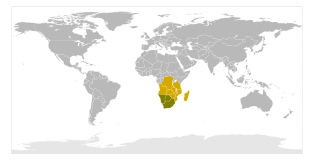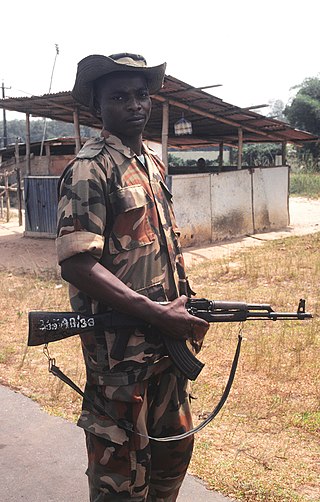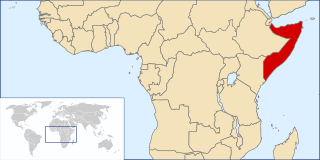
United Nations Security Council resolution 751 is a United Nations Security Council resolution adopted unanimously on 24 April 1992, after reaffirming resolutions 733 (1992) and 746 (1992) and considering a report by the Secretary-General Boutros Boutros-Ghali on the ongoing civil war in Somalia. The council established a United Nations Operation in Somalia I with an immediate deployment of 50 observers in the capital Mogadishu to monitor the ceasefire.

United Nations Security Council resolution 1295, adopted unanimously on 18 April 2000, after reaffirming Resolution 864 (1993) and all subsequent resolutions on Angola, particularly resolutions 1127 (1997), 1173 (1998) and 1237 (1999), the Council authorised a tightening of sanctions against UNITA and established a panel of experts to investigation violations of Security Council resolutions imposing measures against UNITA.

United Nations Security Council Resolution 1916, adopted unanimously on March 19, 2010, after recalling resolutions 733 (1992), 1519 (2003), 1558 (2004), 1587 (2004), 1630 (2005), 1676 (2006), 1724 (2006), 1744 (2007), 1766 (2007), 1772 (2007), 1801 (2008), 1811 (2008), 1844 (2008), 1853 (2008), 1862 (2009), 1894 (2009) and 1907 (2009), the Council extended the term of the Monitoring Group for 12 months and expanded its mandate to include the monitoring of the arms embargo on Eritrea in addition to Somalia.

United Nations Security Council resolution 985, adopted unanimously on 13 April 1995, after reaffirming resolutions 813 (1993), 856 (1993), 866 (1993), 911 (1994), 950 (1994) and 972 (1995), and 788 (1992) which imposed an arms embargo on Liberia, the council established a committee to monitor the implementation of the embargo and extended the mandate of the United Nations Observer Mission in Liberia (UNOMIL) until 30 June 1995.

United Nations Security Council resolution 1343, adopted unanimously on 7 March 2001, after recalling resolutions on Sierra Leone and the region, including resolutions 1132 (1997), 1171 (1998) and 1306 (2000), the Council demanded that Liberia end its support for rebels in Sierra Leone and threatened the imposition of wide-ranging sanctions unless the country complied with the Security Council.

United Nations Security Council resolution 1407, adopted unanimously on 3 May 2002, after recalling resolutions on the situation in Somalia, particularly Resolution 733 (1992), the Council requested the Secretary-General to establish a team to assess requirements for an expert panel to monitor violations of the arms embargo against the country.

United Nations Security Council resolution 1425, adopted unanimously on 22 July 2002, after recalling resolutions on the situation in Somalia, particularly resolutions 733 (1992) and 1407 (2002), the council established a panel of experts to investigate violations of the arms embargo against the country.

United Nations Security Council resolution 1474, adopted unanimously on 8 April 2003, after recalling resolutions on the situation in Somalia, particularly resolutions 733 (1992), 1407 (2002) and 1425 (2002), the council re-established a panel of experts to investigate violations of the arms embargo against the country.
United Nations Security Council resolution 1519 was adopted unanimously on 16 December 2003. After recalling resolutions on the situation in Somalia, particularly resolutions 733 (1992), 1356 (2001), 1407 (2002), 1425 (2002) and 1474 (2003), the council requested the establishment of a monitoring group to investigate violations of the arms embargo against the country.

United Nations Security Council resolution 1521, adopted unanimously on 22 December 2003, after recalling all previous resolutions on the situation in Liberia and West Africa, the council established a monitoring body to oversee international sanctions against Liberia. It was the final Security Council resolution adopted in 2003.
United Nations Security Council resolution 1526, adopted unanimously on 30 January 2004, after recalling resolutions 1267 (1999), 1333 (2000), 1363 (2001), 1373 (2001), 1390 (2001), 1452 (2002) and 1455 (2003) concerning terrorism, the council tightened sanctions against Al-Qaeda, the Taliban, Osama bin Laden and associated individuals and groups.

United Nations Security Council resolution 1533, adopted unanimously on 12 March 2004, after recalling all previous resolutions on the situation in the Democratic Republic of the Congo, the council established a committee to monitor an arms embargo imposed on all foreign and Congolese forces in the east of the country.

United Nations Security Council resolution 1558, adopted unanimously on 17 August 2004, after recalling previous resolutions on the situation in Somalia, particularly resolutions 733 (1992) and 1519 (2003), the Council re-established a group to monitor the arms embargo against the country for a further six months.

United Nations Security Council resolution 1587, adopted unanimously on 15 March 2005, after recalling previous resolutions on the situation in Somalia, particularly resolutions 733 (1992), 1519 (2003) and 1558 (2004), the council re-established a group to monitor the arms embargo against the country for a further six months.

United Nations Security Council resolution 1630, adopted unanimously on 14 October 2005, after recalling previous resolutions on the situation in Somalia, particularly resolutions 733 (1992), 1519 (2003), 1558 (2004) and 1587 (2005), the council re-established a group to monitor the arms embargo against the country for a further six months and condemned the increase in flow of weapons to the country in violation of the embargo.

United Nations Security Council Resolution 1724, adopted unanimously on November 29, 2006, after recalling previous resolutions on the situation in Somalia, particularly resolutions 733 (1992), 1519 (2003), 1558 (2004), 1587 (2005), 1630 (2006) and 1676 (2006), the Council re-established a group to monitor the arms embargo against the country for a further six months and condemned an increase in the flow of weapons to the country.

United Nations Security Council Resolution 2002, adopted unanimously on July 29, 2011, after recalling resolutions 733 (1992), 1519 (2003), 1558 (2004), 1587 (2004), 1630 (2005), 1676 (2006), 1724 (2006), 1744 (2007), 1766 (2007), 1772 (2007), 1801 (2008), 1811 (2008), 1844 (2008), 1853 (2008), 1862 (2009), 1907 (2009), 1916 (2010) and 1972 (2011), the Council tightened sanctions against Eritrea and Somalia to include individuals and entities recruiting or using child soldiers in the Somali Civil War, in addition to those responsible for attacks against schools and hospitals in Somalia.
United Nations Security Council Resolution 1766 was unanimously adopted on 23 July 2007.
United Nations Security Council Resolution 1811 was unanimously adopted on 29 April 2008.
United Nations Security Council Resolution 1844 was unanimously adopted on 20 November 2008.















